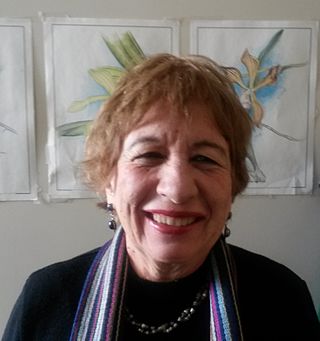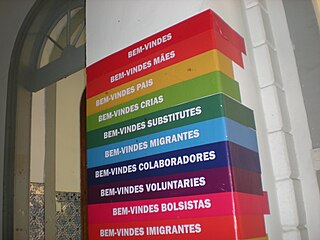Related Research Articles
The Prêmio José Reis de Divulgação Científica is an annual honor awarded by the Brazilian Council of Scientific and Technological Development (CNPq) to the institution, media organization, publication, or individual who most contributed to the dissemination and public awareness of science and technology in Brazil. It is thus named in honor of Dr. José Reis, a Brazilian biologist and science writer who was one of the pioneers in the field.

NGT is a Brazilian television network. The station came about through the acquisition of two educational television concessions by businessman Marco Antônio Bernardes Costa; one in the city of Osasco, in the state of São Paulo, on behalf of the Fundação Fátima, and another in the city of Rio de Janeiro, on behalf of the Fundação Veneza. These concessions became the two headquarters of the network, together producing its national programming. The network has 35 affiliated television stations in 15 Brazilian states, as well as several retransmitters in 17 states, covering 13.6% of Brazilian territory.

Richard Miskolci is a Brazilian sociologist. He is Full Professor of Sociology at UNIFESP, Brazil, and also a researcher of CNPq. Miskolci is the leader of the Research Center Quereres.

Ana Montenegro was a Brazilian author, journalist, activist, editor, and poet. She was a militant communist and lived in exile for more than 15 years after the 1964 coup. She was a lawyer who advised on human rights and women's rights issues and actively fought against racism. She wrote extensively on women's issues, from their health to their socio-economic rights; the legal-cultural struggle of blacks against racism; and the struggles of urban and rural workers to gain their rights under the Constitution. After returning from exile, she was honored by her local bar association, her state, and the nation of Brazil for her human rights work. In 2005, she was one of the 1000 women nominated for the Nobel Peace Prize.

Cristina Possas de Albuquerque is a Brazilian public health scientist working with infectious diseases and emerging infectious diseases from an eco-social perspective.
Narcisa Amália de Oliveira Campos was a Brazilian poet, and women's rights activist. She also considered the first female professional journalist in Brazil.
Legitimate defense of honor is a legal term in Brazilian jurisprudence, used by the defense to justify the defendant's acts as crimes of passion, attributing the motivating factor of the crime to the behavior of the victim. This justification has been used, among other reasons, to eliminate or reduce the culpability of a spouse or lover who has committed violence against a female partner.
The first National Meeting of Black Women took place in Brazil from 2 to 4 December 1988, in Valença, Rio de Janeiro, with 450 women from 17 Brazilian states. This meeting came about from a desire for greater solidarity and organizational structure among black Brazilian women, especially Fluminense women, who had previously organized the First State Meeting of Black Women of Rio de Janeiro in 1987.
This is a bibliography of books by or about the Brazilian director Luiz Fernando Carvalho.

Maria Aparecida Schumaher, known as Schuma, is a Brazilian pedagogue and feminist.

Aparecida Sueli Carneiro Jacoel, best known as Sueli Carneiro is a Brazilian philosopher, writer and anti-racism activist. Carneiro is the founder and current director of Geledés — Instituto da Mulher Negra and a leading author on black feminism in Brazil.
The origins of feminism in Brazil trace back to the 19th century. During the Empire of Brazil, some jurists attempted to legalize women's suffrage, with or without the consent of the husband. Later, the republican constitution of 1891 did not exclude women from voting, because they were not considered individuals who could have rights. That made some women request, without success, their inclusion among the voters. The 1891 constitution initially had a clause that gave women the right to vote, but it was abolished in its last version because the idea that politics was not an honorable activity for women prevailed.
Maria Rita Soares de Andrade was a Brazilian lawyer and judge, who became Brazil's first female federal judge in 1967. She was also the first woman to enter the Order of Attorneys of Brazil.

Ana Vicente was an Anglo-Portuguese writer with a strong Catholic faith, known for her support for feminist causes.
Maria Alzira Lemos, also known as Maria Alzira Costa de Castro Cardoso Lemos (1919–2005), was a Portuguese parliamentary deputy, socialist, feminist and women's rights activist, who assisted with the creation of the Portuguese Platform for the Rights of Women.

Gender-neutral language in Portuguese is a recent strand of demands for greater gender equality and social inclusion between men, women and non-binary individuals. It can be divided into inclusive or non-sexist language, and non-binary or neuter language or neolanguage. Inclusive language aims to use existing words to include all genders, while neuter language uses new or modified words to accomplish this.
Maria Lúcia Amaral is a Portuguese lawyer, university professor, politician and judge. She was vice-president of the Constitutional Court of Portugal and is Portugal's 10th Ombudsman, being the first woman to hold this post.
Teresa Joaquim is a social anthropologist who is the coordinator of the first master's program in women's studies in Portugal. Women's Studies – Gender, Citizenship and Development was launched at the Universidade Aberta in 1995 and Joaquim pressed for it to be expanded to include a PhD platform in 2002. She served as a member of the National Ethics Council for Life Sciences between 1996 and 2001 and as part of the Helsinki Group on Women in Science. She has participated in numerous policy development projects evaluating inclusion and equal opportunity for women for the government of Portugal, as well as the European Union.
Miriam Lifchitz Moreira Leite was a Brazilian sociologist, researcher, university professor and writer, winner of the Jabuti Award.
Bila Sorj is a Brazilian academic and pioneer of women's studies. Born in Brazil, she made aliyah to Israel to work communally on a kibbutz and earn her bachelor's and master's degree from the University of Haifa. Returning to Brazil in 1976, she taught sociology and began incorporating women's studies into her work at the Federal University of Minas Gerais. Completing her PhD at the University of Manchester in 1979, she began teaching at the Federal University of Rio de Janeiro in 1984. She completed post-doctorate studies at the School for Advanced Studies in the Social Sciences in Paris. Her research primarily focuses on employment and the ways that gender affects both paid and unpaid labor. She also studies Judaism. Her 2000 book, Israel terra em transe: democracia ou teocracia?, was a finalist for the Prêmio Jabuti in 2001. She is the coordinator of the Núcleo de Estudos de Sexualidade e Gênero in the graduate program of the department of Anthropology and Sociology at the Federal University of Rio de Janeiro. She is regarded as one of the academics who opened the field of gender studies in Brazil.
References
- CNPq (ed.). "Albertina Gordo de Oliveira Costa" (in Portuguese). Ministério da Ciência, Tecnologia e Inovação. Retrieved 20 August 2013.
- Parreira Cordeiro, Jaime Francisco (2002). Falas do novo, figuras da tradição: o novo e o tradicional na educação brasileira (anos 70 e 80) (in Portuguese). UNESP. p. 251. ISBN 978-857-139-384-4.
- Bruschini, Maria Cristina A.; Ardaillon, Danielle; Unbehaum Ridenti, Sandra G. (1998). Tesauro para estudos de gênero e sobre mulheres (in Portuguese). Editora 34. p. 302. ISBN 978-857-326-111-0.